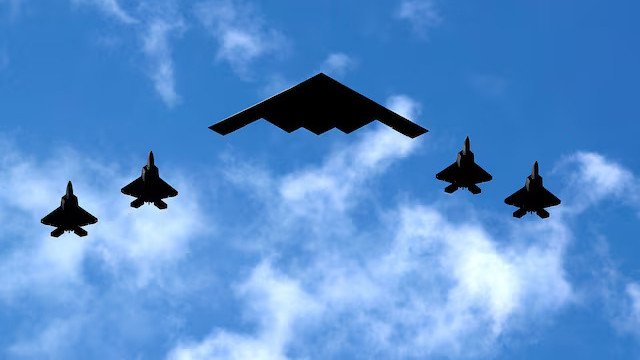US President Trump Orders Strikes on Iran’s Nuclear Sites, Warns of Further Action
June 22, 2025 — WebDesk
In a historic escalation of U.S.–Iran tensions, President Donald Trump confirmed that American forces conducted precision airstrikes on three of Iran’s most sensitive nuclear facilities—Fordow, Natanz, and Isfahan—using B‑2 stealth bombers loaded with bunker-buster bombs and an array of Tomahawk cruise missiles, in coordination with Israeli counterparts.
Trump called the mission a “very successful military operation” and declared the sites were “completely and totally obliterated.”
“Iran, the bully of the Middle East, must now make peace,” he said, warning of “far greater” future strikes if Tehran refuses.
Market Turmoil & Risk Assessments
Global markets responded sharply. Oil prices spiked, prompting concerns that it could hit $80 a barrel or even $100 if Iran retaliates by targeting shipping lanes or drilling platforms
Cryptocurrency markets also fell—Ether dropped over 5%, while Bitcoin declined about 1%. Analysts warn that prolonged instability may increase inflation and hurt economic growth.
Broader Reactions
- Arab and Western leaders are urging restraint. New Zealand called the development “worrying” and urged diplomacy over force.
- Mexico, Australia, and multiple European nations echoed calls for peace and for international mediators to step in.
- The UN Secretary-General cautioned that the strikes could spiral into a full-blown regional war with catastrophic consequences.
What It All Means
- These airstrikes are the first direct U.S. assault on Iran’s nuclear infrastructure in over a decade.
- Targeting bunkered sites—especially Fordow, buried deep within a mountain—required B‑2s and Massive Ordnance Penetrators.
- The goal: cripple Iran’s uranium enrichment capability, but without triggering full-scale regime change.
However, legal scholars and Democratic lawmakers are questioning the legality of the strikes, arguing that the President bypassed Congressional authorization, with possible legal challenges ahead.
READ MORE: Trump rejects Israeli plan to kill Iran’s Supreme Leader, US officials say
What’s Next
- Iran may retaliate, using proxies or oil infrastructure as leverage.
- Oil markets remain on edge, with global inflation risks rising.
- Diplomatic negotiations are at a standstill, prompting calls for a renewed Geneva nuclear dialogue.
President Trump emphasized a clear message: “Peace now—or face more devastation.” But with growing global unease and legal scrutiny, the repercussions of this decisive move may reverberate far beyond the Middle East—testing not only Iran’s response, but also the durability of international law and global economic stability.


